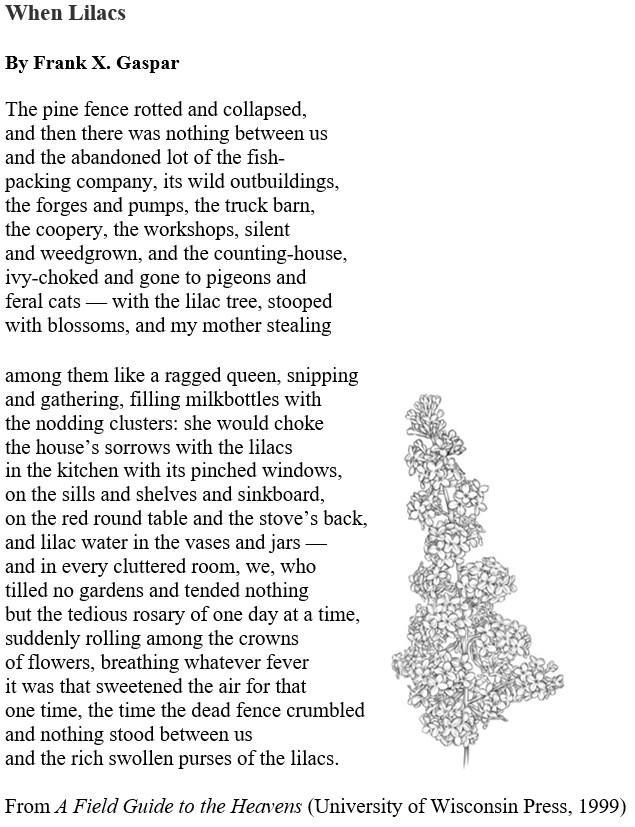“There’s all this beauty around you,” Frank X. Gaspar says of the Provincetown he grew up in in the 1950s and ’60s. “Not a gentle beauty but a rugged beauty.”
His poems and fiction, often based on his experience growing up in Provincetown’s Portuguese community, delineate this distinction, intermixing beauty with the sober realities of a more hardscrabble time.

“It was very primitive with almost no resemblance to today,” Gaspar says. “People still burned coal. People in the West End didn’t have hot running water.” His childhood home on Commercial Street, near the current Coast Guard Station, abbuted a fish-cutting plant where his mother worked. “She left school in the 10th grade to cut fish,” he says.
In Gaspar’s poem “When Lilacs,” his mother plucks “rich swollen purses of lilacs” from a bush in the “abandoned lot of the fish-packing company. … She would choke the house’s sorrow with the lilacs.”
In another poem, “Quahogs,” Gaspar describes harvesting clams with “our skin burning” in “the withering gusts.” The clams are then savored with “precious butter.”
Amid the struggles of growing up poor in Provincetown, Gaspar found a certain beauty and grace embodied not only in images but also in the town’s artists and writers. “I just took care of myself,” Gaspar says. “I started working at 15. I sold hot dogs at a stand on the pier.”
After work, he would stay out until the early morning, immersing himself in the atmosphere of 1960s Provincetown and finding himself attracted to writers and artists.
“It kept me alive,” he says. “I knew these people were right. I wanted that life. I knew that’s what I was.”
At 17, Gaspar left Provincetown to pursue a creative life in New York. “I knew exactly what I was doing when I left,” he says. “I always had that direction, and I still do.” His trajectory was diverted when he was drafted into the Navy during the Vietnam War. He completed two tours in the Pacific from 1966 to 1969. After the war, he took advantage of the G.I. Bill, enrolling in writing classes and eventually earning his M.F.A. from the University of California Irvine. Since then, he has lived mostly in California and has written five collections of poetry and two novels. He currently teaches in the M.F.A. program at Pacific University in Oregon.
Although the artists and writers of Provincetown gave Gaspar confidence and direction, it was the town’s Portuguese community that became his muse — a community that existed, literally and figuratively, on the other side of town from the bohemian East End.
In the opening pages of his novel Stealing Fatima, Gaspar describes this divide at Halloween: “The center of town would be starting to bustle already along Front Street, a great carnival for the tourists and other People from Away — elaborate costumes and parties, shows in the noisy bars and bright cabarets, stunning drag queens parading in faultless riots of color — but here, just a few lanes back from the waterfront, a different town moved among smaller, quieter streets.”
“I have a lot of nostalgia for old Provincetown,” Gaspar says. “It left a real stamp on me.”
In the Provincetown of Gaspar’s memory, ghosts of Portugal haunt his family. His grandparents immigrated from the Azores. He paints images of the town in sharp, sensory detail: in his poem “For No One,” he describes “bushes crowding an old road that ran to nothing in purple woods”; in “First Snow,” he writes of the snow that “settles like lace on the black of the yard.”
Catholicism also figures prominently in his work. “The church was very important,” says Gaspar. “It provided guidance. We had a lot of activities — novenas, confessions every Saturday, services on Sundays.” This influence surfaces in Stealing Fatima, which is about a local priest, and in many poems where Gaspar contends with God.
In the introduction to his debut collection of poems The Holyoke, Mary Oliver reflects on his spiritual bent: “He is attentive to what there is too much of — the darkness. And he will not let it go until it gives up some glow, some thrust of light.”
Gaspar became friends with Oliver after leaving Provincetown; their friendship lasted more than 30 years.
“We never really talked about art and poetry,” he says. “We just had so much fun together. We laughed a lot.”
Oliver, so intricately tied to Provincetown, writes about how the creative class often discussed their own contributions to the town’s culture. “None of us was born here,” she writes. “And no one … ever considered the possibility of a Frank Gaspar.”
Upon the publication of his first novel, Leaving Pico, in 1999, Gaspar found his community pleased to see a local story “being told not by someone from away” and proud to “finally have a book that came out of the town.”
In his latest work, The Poems of Renata Ferreira, Gaspar brings together different Provincetown worlds, bridging the Portuguese, artistic, and gay communities. In this cross-genre work, Gaspar writes a foreword in his own voice, drawing from his youth, whereas the body of the text is a collection of poems in the voice of Renatta, a fictional “boarder that came to live in our house.”
“Everyone in the West End took in boarders in summer, most of them artists or gay,” says Gaspar. In this book, Gaspar describes the writing process as akin to channeling the poems of Renatta, a lesbian writer from Lisbon during the final years of Portugal’s fascist regime.
Like Renatta and his ancestors, Gaspar left home and found that its spell cast a long shadow. He settled in Los Angeles, and although he returns frequently — this week for a reading that is part of the Provincetown Portuguese Festival — he has no intention of resettling here.
“Provincetown is the space of my imagination,” he says. “I prefer it that way.”



